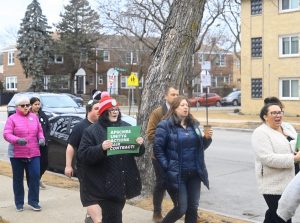Go green this spring semester at NEIU
November 19, 2019
This spring, NEIU is offering 60 courses across varying disciplines which focus on the issues of climate change. As climate change emerges as a hot topic around the world, an international effort to discuss and rectify climate change has manifested itself.
NEIU offers a multitude of disciplines for students across several majors and academic levels. Some areas of study include but are not limited to art, linguistics, women and gender studies and world languages and cultures.
“We’re going to be looking at some of the interventions that feminist philosophers have suggested we make into environmental ethics,” said Stacey Goguen, professor of philosophy. Goguen will teach Feminist Ethics (PHIL 366) next semester as part of the climate change program.
According to an information booklet provided by NEIU’s College of Arts and Science, “The suite of courses that are part of this program aim to tackle many of these issues, dimensions, and challenges from a diverse range of perspectives and disciplinary lenses.”
Integration of the topic within an expanded host of classes and perspectives is important for combating climate change at large. One individual can not solve climate change on their own and by allowing hundreds of people across different backgrounds to enter the conversation, NEIU hopes to uncover different solutions to the world’s foremost environmental question.
Miranda Green, President of the Green Conservation Group at NEIU said in an email, “The subject of climate change affects every discipline of study and aspect of our personal, as well as academic lives, whether we choose to acknowledge it or not. In order to adequately inform students about the risks of climate change or the potential futures that we will confront, climate realities must be communicated in a way that is accessible, interconnected and allows us all to take part in building hope for the future.”
Green continued: “Considering the dramatic changes in climatic patterns that have already produced intense freezing conditions and heavy precipitation on campus this semester, most are willing to admit the science is settled and changes are already occurring. At this point, we need bright minds from every discipline, identity and capacity level to confront the problem publicly and seek solutions that work, collectively.”
While some may balk at the prospect of integrating climate change dialogue in otherwise unrelated courses, Lewis Gebhardy, an associate professor of linguistics, spoke to the significance of discourse on climate change.
“In principle, it’s an important issue and in the places where it can be integrated into classes it would be fine,” said Gebhardt. “You don’t want to go astray from the class too much, but it can be integrated into discussions about communities, language identity, language maintenance and things like that. And the more, of course, we can integrate any courses, anywhere in the university with other courses in the university or other topics in society at large, I think that’s great.”
Interested in finding out more? Contact the Dean of the College of Arts and Sciences, Dr. Katrina Bell-Jordan at K-Bell1@neiu.edu for more information or the Green Conservation Group at GCG@neiu.edu to get involved.









